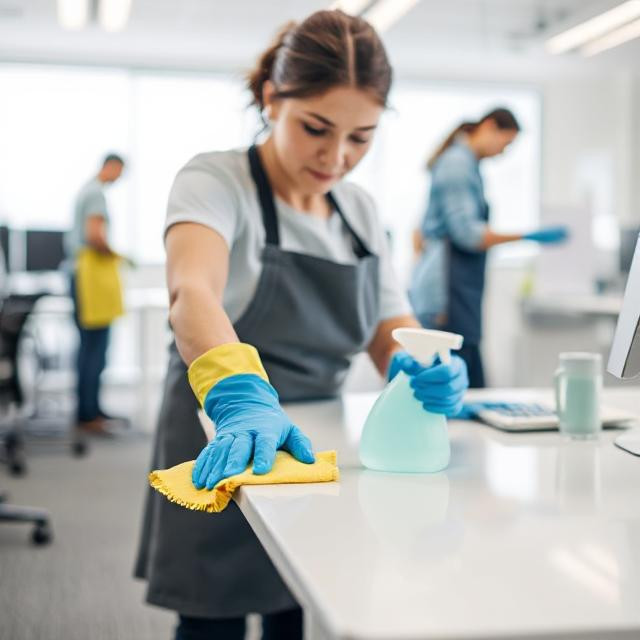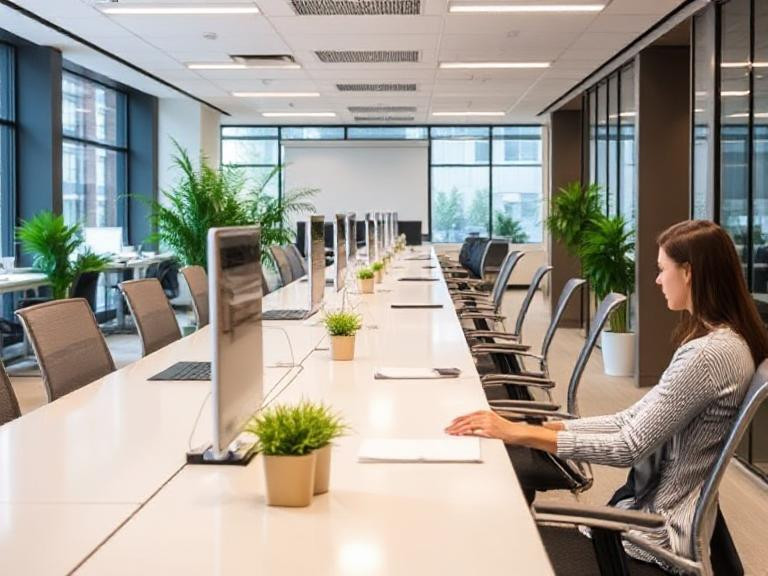The Cost of Office Cleaning Services in the UK: What to Expect and How to Get Value

In today's dynamic business environment, maintaining a clean and hygienic office is more than just an aesthetic choice; it's a fundamental aspect of employee well-being, productivity, and professional image. From attracting top talent to impressing clients, a pristine workspace speaks volumes about your organisation. But for many UK businesses, a key question arises: what's the real cost of office cleaning services in the UK?
Navigating the landscape of commercial cleaning prices UK can seem daunting, with variations influenced by a multitude of factors. This comprehensive guide will demystify what to expect when budgeting for your office cleaning, break down the key determinants of cost, and provide practical advice on how to secure excellent value for your investment.
Understanding the Basics: Average Office Cleaning Rates in the UK
Let's start with a general overview. Average office cleaning rates in the UK typically fall within a range, rather than a fixed price. Most companies charge either an hourly rate per cleaner or a total fixed fee based on the scope of work.
Hourly Rates: You can generally expect to pay anywhere from £15 to £30 per hour per cleaner for standard office cleaning services across the UK. London and the South East often see slightly higher rates, typically in the £17 to £30 per hour range, while the Midlands, North England, Scotland, and Wales might find rates from £12 to £25 per hour. For more specialised tasks or out-of-hours cleaning, these rates can increase, sometimes exceeding £50 per hour.
Per Square Metre: Some companies may provide quotes based on the size of your office. While less common for standard recurring cleans, this can be useful for initial estimates or larger, less frequent deep cleans. Expect figures to be in the region of £1.60 to £3.20 per square metre for regular cleaning. Deep cleaning can range from £2.15 to £3.20 per square metre.
Fixed Fees: Many businesses prefer a fixed monthly or weekly fee, especially for regular contracted services. This provides budgetary certainty. These fees are derived from an assessment of the office size, cleaning frequency, and specific tasks required. For example, a small office (under 280 square metres) might pay £195 – £500 per month, while a medium office (280 – 560 square metres) could see costs of £500 – £800 per month. Larger offices (over 560 square metres) will naturally incur higher monthly costs, potentially £800 – £1,300+.
It's crucial to remember that these are averages. Your specific UK office cleaning quotes will depend heavily on the unique characteristics of your workspace and your cleaning requirements.
Key Factors Affecting Office Cleaning Costs
So, why such a range in commercial cleaning contract pricing? Several critical factors affecting cleaning costs come into play:
Office Size and Layout:
Square Metres: This is perhaps the most obvious determinant. A larger office naturally requires more time, more cleaning staff, and more supplies, directly increasing the overall large office cleaning prices. Conversely, small office cleaning costs will be considerably lower.
Complexity of Layout: An open-plan office might be quicker to clean than a space with numerous small offices, meeting rooms, and intricate layouts. More obstacles, such as multiple partitions, cubicles, and densely packed workstations, will increase cleaning time and, consequently, the cost.
Frequency of Cleaning:
Daily Office Cleaning Prices: Businesses requiring daily cleaning (e.g., busy call centres, public-facing offices) will have the highest frequency-related costs. However, daily cleaning can often lead to lower per-visit costs compared to less frequent deep cleans, as the daily upkeep prevents build-up.
Weekly Office Cleaning Cost / Bi-Weekly: This is a popular choice for many businesses, offering a good balance between cleanliness and cost-efficiency.
Monthly Office Cleaning Rates / Fortnightly / One-Off: Less frequent cleaning or one-off deep cleans tend to have a higher hourly or per-visit rate due to the greater accumulation of dirt and the more intensive work required.
Type and Scope of Cleaning Services Required:
Not all cleaning is equal. The specific tasks included in your office cleaning contract will significantly impact the price.
Standard/Routine Cleaning: This typically covers daily tasks like vacuuming, mopping hard floors, dusting surfaces (desks, shelves, skirting boards), emptying bins, cleaning and sanitising restrooms, and wiping down kitchen/breakroom surfaces. These are the most common and generally the most affordable services.
Deep Office Cleaning Cost: This goes beyond routine tasks and involves more intensive work, such as carpet shampooing, floor polishing, high-level dusting, thorough disinfection of high-touch points, cleaning inside windows, and detailed cleaning of kitchen appliances. These services are often performed quarterly, bi-annually, or as one-off projects and come at a higher price.
Specialised Cleaning Needs: Do you have specific requirements? This could include:
IT Equipment Cleaning: Delicate and specialised cleaning for computers, keyboards, and monitors.
Window Cleaning: Interior and exterior window cleaning (especially for high-rise buildings, which will require specialist equipment and certified teams, increasing costs).
Upholstery Cleaning: Cleaning of office chairs, sofas, and other fabric furnishings.
Floor Maintenance: Stripping, waxing, or buffing hard floors.
Waste Management: Beyond standard bin emptying, specific waste disposal requirements (e.g., confidential waste, hazardous materials) can add to the cost.
Disinfection Services: Enhanced sanitisation, particularly crucial in a post-pandemic world, may involve specialist fogging or electrostatic spraying.
Supply Management: Some cleaning companies include the cost of consumables (toilet paper, hand soap, paper towels) in their quote, while others expect the client to provide them. Clarify this upfront.
Location of Your Office:
As with most services in the UK, geographical location plays a considerable role. Office cleaning services London prices are typically higher than in other regions due to increased operating costs, higher wages, and greater competition. Areas with higher costs of living generally translate to higher labour costs for cleaning companies.
Time of Cleaning:
Out-of-Hours Cleaning: If you require cleaning outside of standard business hours (e.g., early mornings, evenings, weekends, or public holidays), you should expect to pay a premium. Cleaners often receive higher rates for unsocial hours, and this is passed on to the client.
Emergency Cleaning: Urgent, unplanned cleaning services will also carry a higher charge.
Experience and Reputation of the Cleaning Company:
Established, reputable cleaning companies with extensive experience, comprehensive insurance, and accreditations (like ISO certifications or SafeContractor) may charge more. This premium often reflects a higher quality of service, better training for staff, adherence to health and safety regulations, and greater reliability. A newer or less experienced company might offer lower office cleaning rates to build their client base, but it's essential to balance cost with quality and peace of mind.
Contract Length and Terms:
Many commercial cleaning companies offer discounts for longer-term contracts. Committing to a 12-month or longer agreement can often result in more favourable commercial cleaning contract pricing per visit compared to short-term or one-off arrangements.
Equipment and Products:
Some quotes include the cost of all cleaning equipment and eco-friendly or specialised cleaning products, while others might offer a lower rate if you provide certain supplies. Clarify what's included to avoid hidden costs. Eco-friendly cleaning products can sometimes be slightly more expensive but align with a business's sustainability goals.
What Should Be Included in Office Cleaning Quotes?
When requesting UK office cleaning quotes, ensure they are detailed and transparent. A good quote should clearly outline:
Specific Services: A comprehensive list of all cleaning tasks to be performed (e.g., vacuuming, dusting, bin emptying, restroom sanitisation, kitchen wipe-down, glass cleaning).
Frequency: How often the cleaning will occur (daily, weekly, fortnightly, monthly, one-off).
Duration: Estimated time per clean or total hours per week/month.
Number of Cleaners: How many cleaners will be assigned to your premises.
Hourly Rate (if applicable): The charge per cleaner per hour.
Fixed Fee (if applicable): The total cost for the agreed services over a period.
Inclusions: What equipment, cleaning products, and consumables (e.g., toilet paper, hand soap) are included in the price.
Exclusions: Any services not covered, or additional charges (e.g., for out-of-hours work, specialised cleaning, waste disposal, or congestion/parking fees in urban areas like London).
Insurance: Confirmation of public liability and employers' liability insurance.
Payment Terms: How and when payments are due.
Contract Length and Termination Clauses: Details about the agreement duration and conditions for ending the contract.
Getting Value for Money: How to Optimise Your Office Cleaning Costs
Finding the right balance between cost and quality is key to getting value for money cleaning. Here’s how you can optimise your cost of office cleaning services:
Be Clear About Your Needs: Before seeking quotes, define your exact requirements. What areas need cleaning? How often? Are there specific high-traffic zones or sensitive areas (e.g., server rooms, laboratories) that need special attention? A detailed brief helps companies provide accurate quotes and avoids scope creep.
Get Multiple Quotes: Don't settle for the first quote you receive. Obtain at least three detailed commercial cleaning quotes from different providers. This allows you to compare prices, services, and identify competitive offers.
Consider Cleaning Frequency: While daily cleaning offers the highest level of hygiene, a weekly or bi-weekly schedule might be sufficient for smaller offices with less foot traffic, helping to manage office cleaning costs. Assess your actual needs versus perceived needs.
Prioritise Services: Determine which cleaning tasks are essential for your daily operations and which are "nice-to-haves" that can be done less frequently (e.g., deep carpet cleaning might only be needed quarterly or bi-annually).
Negotiate: Don't be afraid to negotiate, especially if you have a larger office or are committing to a long-term contract. Cleaning companies often have some flexibility in their pricing.
Provide Clear Access: Ensure your office is easily accessible for cleaners, and clear of clutter that might impede their work. This can reduce the time required, potentially lowering your overall hourly rates for office cleaners UK.
Discuss Consumables: Decide whether you will provide cleaning products and consumables or if you prefer the cleaning company to manage this. Sometimes, buying in bulk yourself can be more cost-effective.
Check References and Reviews: A low price is not always the best deal if the quality of service is poor. Check online reviews, ask for testimonials, and ideally, speak to existing clients of the cleaning company. A reliable, high-quality service ensures a consistently clean workplace, which ultimately contributes to better hygiene standards office and prevents more costly deep cleans down the line.
Look for Experience in Your Sector: Some cleaning companies specialise in certain sectors (e.g., medical, industrial, corporate). They may have a deeper understanding of the specific hygiene requirements and regulations pertinent to your business, offering better professional office cleaning solutions tailored to your needs.
The Return on Investment: Beyond Just Cost
While cost is a crucial consideration, it's vital to view office cleaning as an investment rather than just an expense. A clean and hygienic office delivers significant returns:
Enhanced Employee Well-being and Productivity: A tidy and sanitary environment reduces the spread of germs, lowers absenteeism, and creates a more pleasant atmosphere, boosting morale and focus. This directly impacts employee performance and overall output.
Positive First Impressions: Clients, visitors, and potential employees form immediate impressions based on the cleanliness of your premises. A spotless office projects professionalism, attention to detail, and success.
Brand Reputation: Maintaining high hygiene standards office reinforces your brand's commitment to quality and care, both internally and externally.
Extended Asset Lifespan: Regular and professional cleaning helps preserve the condition of your office furniture, carpets, and fixtures, extending their lifespan and delaying replacement costs.
Compliance and Safety: For certain industries, maintaining specific cleanliness standards is a regulatory requirement. Professional cleaning ensures compliance and a safer environment for everyone.
Conclusion
The cost of office cleaning services in the UK is a variable sum, shaped by your unique business needs, location, and the level of service you require. From hourly rates for office cleaners UK to comprehensive commercial cleaning contract pricing, understanding these factors empowers you to make informed decisions.
By clearly defining your expectations, seeking multiple detailed UK office cleaning quotes, and prioritising services based on your true needs, you can secure a professional and reliable cleaning solution that offers excellent value for money cleaning. Remember, a clean office isn't just a clean space; it's a strategic asset that contributes significantly to your business's success and the well-being of its most important asset: its people. Investing in professional office cleaning is an investment in a healthier, more productive, and more impressive workplace.





600a74899aac4.png)